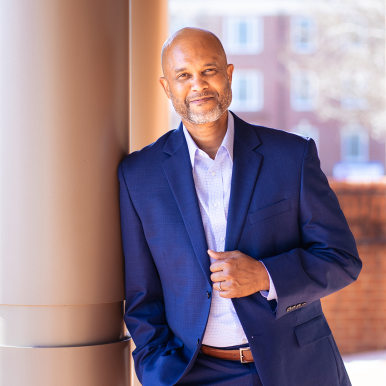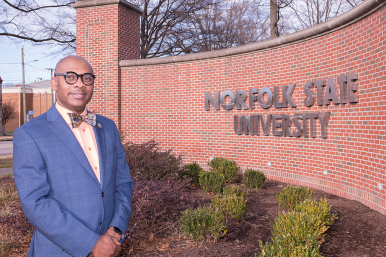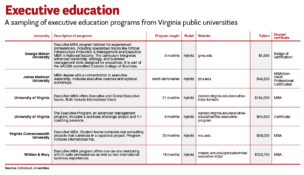Head of the class
Virginia HBCUs’ enrollment outpaces peers
Head of the class
Virginia HBCUs’ enrollment outpaces peers
Donald Alexander Jr. considered multiple schools, as well as the Air Force, before he landed at Norfolk State University in 2019.
The Chesapeake native grew up with strong ties to the university, one of Virginia’s two public historically Black colleges and universities. As an elementary schooler, Alexander went to summer camp on Norfolk State’s campus, and several aunts, uncles and cousins attended the school. His uncle, Melvin T. Stith Sr., a former dean at Florida State University, received his bachelor’s degree from Norfolk State and served as its interim president from 2017 to 2019.
After high school, Alexander attended a summer program offered by Norfolk State to help him prepare for the academic experience, and fell in love with the college. He also found comfort in building connections with peers who had similar backgrounds and experiences.
“We were in a time where racial profiling was active again. It was a big thing when I was going into college, and I feel like a lot of African Americans, when they choose HBCUs, they choose them because of the comfortability that they will have,” says Alexander, now a 22-year-old senior majoring in computer science. The shared experience of an HBCU, he says, “allows you to have more people to lean on, to have more people to get close with.”

At a time when overall undergraduate enrollment is declining nationally, Alexander is among a wave of Black students who are choosing HBCUs over predominantly white colleges and universities.
According to the National Student Clearinghouse Research Center, undergraduate enrollment in colleges and universities declined 4.2% from 2020 to 2022. Meanwhile, undergraduate enrollment at HBCUs grew 2.5% in fall 2022, reversing a 1.7% decline from the previous year. That growth was driven by a 6.6% increase in freshmen enrolling at HBCUs, the NSCRC noted.
Virginia’s 15 four-year public universities, including HBCUs Norfolk State and Virginia State University, are slightly ahead of national trends. Undergraduate enrollment declined 2% between fall 2020 and fall 2022, according to an analysis of data from the State Council for Higher Education for Virginia. Enrollment at Virginia private colleges that report data to SCHEV fell 4% during the same period.
However, during the same two-year period, VSU and NSU saw huge undergraduate enrollment boosts — increases of 18% and 7% — far outstripping their larger, predominantly white public counterparts. Only William & Mary came close to matching those increases, with a 9% enrollment boost from 2020 to 2022. By comparison, Longwood and Radford universities saw undergraduate enrollment decreases of 20% and 18%, respectively, during that same time.
Nationally, combined total enrollment at HBCUs grew 25% from 1980 to 2015, rising from 234,000 to 293,000. But that growth wasn’t as rapid as it was for all colleges and universities combined, which saw enrollment nearly double during the same time period, according to data from the National Center for Education Statistics. From 1976 to 2014, the percentage of Black college students attending HBCUs fell from 18% to 8%, a trend that has been reversing more recently.
Fall 2022 enrollment data from two of Virginia’s three private HBCUs, Hampton and Virginia Union universities, is incomplete, and neither granted Virginia Business’ requests for interviews. Virginia University of Lynchburg, another Virginia HBCU, does not report data to SCHEV because it does not receive state funding. VUL did not respond to interview requests from Virginia Business.
Social justice, strategic planning
Administrators at VSU and NSU say enrollment increases at their universities are a result of numerous factors and follows a trend seen nationally among the 101 HBCUs located across 19 states, Washington, D.C., and the U.S. Virgin Islands.
Juan Alexander, associate vice president for enrollment management at NSU, and VSU Provost Donald Palm, who is also senior vice president of academic and student success and engagement, cite the Black Lives Matter movement for helping to raise the visibility of HBCUs. Social justice rallies that swept the country in 2020 fueled greater corporate awareness for diversity, equity and inclusion and sparked philanthropic giving to HBCUs, including record gifts from philanthropist MacKenzie Scott. Scott’s 2021 donations of $30 million to VSU in 2020 and $40 million to NSU represented the largest gifts each university has ever received. She also gave a record $30 million to Hampton University in 2020.
While those donations also led to media exposure and are helping fund scholarships and other initiatives, including research laboratories, faculty and staff conferences and training, and venture capital funds at NSU, they also coincided with efforts to enhance admissions, says Alexander, who also credits the university’s marketing strategies and use of alumni in boosting enrollment.

For example, Norfolk State had also been working to streamline and remove barriers to its admissions process. NSU’s Alexander (no relation to NSU senior Donald Alexander) says that around December 2021 the university joined the Common App, an undergraduate application that allows students to apply to as many as 1,000 member colleges and universities by using one form. That’s allowed NSU, which has only about five recruiters, to expand its reach to students it might not otherwise reach. Fewer than about a dozen HBCUs currently use the Common App, and about 30% of NSU’s incoming freshmen in fall 2022 applied using it, he says.
In addition, NSU added virtual college tours and virtual appointments, including with financial aid counselors. It also moved to a new customer relations portal that allows the university to keep in touch with students “at every stage” of the enrollment and application process.
“We’re up about 131% from last year in our freshman first-time acceptances … so that’s a good sign,” Alexander says. “It looks like we’re gonna have a pretty hefty freshman class again this coming fall.”
Meanwhile, VSU, located in Chesterfield County’s Ettrick area near Petersburg, broke a 30-year record for the 2022-23 academic year, enrolling more than 1,700 first-time freshmen and transfer students, for an increase of 550 new students over the previous academic year, which also broke enrollment records.
VSU launched a strategic plan in fall 2020. One prong of that plan includes improved marketing and branding efforts. Social media is an important part of that, and has gotten attention, Palm adds. “Our students are so engaged. That’s where are students are — on social media. So we are in the social media game.”
VSU ranked No. 27 among all NCAA Division II schools for overall social media engagement in 2022, according to social media marketing analysis company Rival IQ, but took the No. 1 spot on Twitter, with 19,043 engagements, and No. 3 on Facebook, with 151,362 engagements.
Another program helping boost enrollment is the state-sponsored Virginia College Affordability Network. Launched in 2021 to support the state’s two public HBCUs, it provides free tuition for Pell Grant-eligible first-year students who live within 40 miles of VSU or within 45 miles of NSU. About 600 VSU students have taken advantage of the program and about 300 students have benefited from it at NSU.
The program has helped encourage some students who may have looked farther from home for their higher education to stay local, Palm says.
“We’re reaching those students who — many students want to go elsewhere — they want to leave home to go to college,” Palm says.
At NSU, Donald Alexander credits the personal attention and family atmosphere he’s found there with helping him push himself, something he’s unsure might have happened if he’d gone to a non-HBCU. He’s been a member of NSU’s student government, including its chief justice during the 2021 to 2022 academic year, and after the Black Lives Matter protests he served as an SGA liaison to handle student relations with campus police.
He likes that the university hosts “Soul Food Thursday,” offering Southern comfort foods like fried chicken, macaroni and cheese, and cornbread.
“There’s nothing like an HBCU, honestly, and any HBCU student could attest to that,” he says. “The atmosphere there is unmatchable. It’s just something that is going to stick with you for the rest of your life.”
Sarah King contributed to this story.
Virginia HBCUs at a glance
Virginia has five historically Black colleges and universities, spread across Hampton Roads and Central Virginia. Some of the oldest in the nation, these institutions are a mix of public and privately run schools.
Hampton University
Located in Hampton, the private, not-for-profit university is on
314 acres and has 3,317 students, 2,867 of them undergraduates.1 It was founded in 1868 as Hampton Normal and Agricultural Institute. In July 2022, Hampton welcomed its new president, retired U.S. Army Gen. Darrell K. Williams; he succeeds William R. Harvey, who had served as the university’s president since 1978.
Norfolk State University
The four-year public school near downtown Norfolk was founded in 1935. It has a 134-acre campus and has 5,786 students. NSU’s December 2021 commencement speech was delivered by music superstar and Virginia Beach native Pharrell Williams, who also hosted his Elephant in the Room business forum at NSU that year. NSU unveiled its 6,000-square-foot Micron-NSU Nanofabrication Cleanroom in October 2021.
Virginia State University
Virginia State University was founded in 1882 as one of Virginia’s two public land-grant institutions (the other is Virginia Tech). Located in Chesterfield County’s Ettrick area near Petersburg, its 231-acre campus overlooks the Appomattox River. VSU has 4,300 undergraduates and 348 graduate students.
Virginia Union University
The private university was founded in 1865. Hartshorn Memorial College, a women’s college established in Richmond in 1883, became part of VUU in 1932. Storer College, a Black Baptist college in West Virginia that closed in 1955, merged its endowment with VUU. The university has 1,730 students, 1,243 of them undergraduates.1
Virginia University of Lynchburg
Virginia University of Lynchburg traces its origins to the 1886 founding of the Lynchburg Baptist Seminary. Renamed over the
years, VUL was incorporated as Virginia University of Lynchburg
in 1996. The private not-for-profit school has 558 students, 217
of them undergraduates.1
1 National Center for Education Statistics
<

















